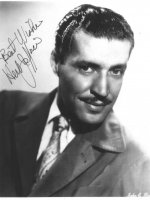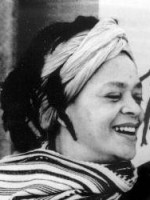Midnight Ramble is a american film of genre Documentary with James Avery
Midnight Ramble (1994)
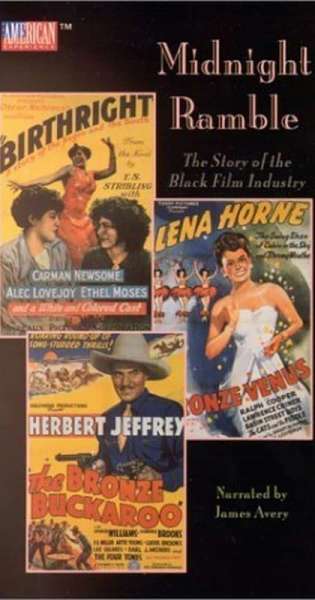
If you like this film, let us know!
Length 1h
OriginUSA
Genres Documentary
Themes Documentary films about business, Documentary films about the film industry, Documentary films about cities
Rating13%










Midnight Ramble is a 1994 documentary about the early history of Black American movies from the period between 1910 and 1950. Known as "race movies", these films, traditionally independent of Hollywood, were made primarily by, for and about the Black Community. This documentary is a tribute to a film genre that lasted for more than forty years, produced over 500 movies, and created a foundation for contemporary films from directors such as Spike Lee and Tyler Perry. James Avery narrates this exploration of the early black film industry. There is a mistaken assumption that 'race films' began largely in reaction to D. W. Griffith's 1915 The Birth of a Nation. Nothing could be further from the truth. Race movies actually began around 1910 in Chicago in response to the Black Community longing to see themselves reflected on the silver screen via this new medium of film. Wanting to see themselves through their own eyes, on their own terms thus counteracting the Hollywood stereotypes within the American media. The film focuses especially on the work of Oscar Micheaux, considered the 'Dean of Black American film,' a controversial filmmaker who wrote, produced, and directed over 40 features, and tackled difficult social issues in Black America. It includes clips from films by a number of African-American directors of the period, which is very helpful since many of these films are difficult to find or unavailable. There are two versions of the title of the documentary, both referring to the same work. Initially released in 1994 as, Midnight Ramble: Oscar Micheaux & the Story of Race Movies It was re-released as Midnight Ramble: The Story of the Black Film Industry by PBS in 1995 The 1995 version also eliminates the David McCullugh introduction.
Synopsis
The documentary begins with an explanation of the social context for American blacks at the turn of the 20th century. It then looks at milestones in the development of race films. This includes a look at early silent films, most notably the work of William Foster (The Pullman Porter, 1910).Actors
Comments
Leave comment :
Suggestions of similar film to Midnight Ramble
There are 18 films with the same actors, 8965 with the same cinematographic genres, 1034 films with the same themes (including 44 films with the same 3 themes than Midnight Ramble), to have finally 70 suggestions of similar films.If you liked Midnight Ramble, you will probably like those similar films :
 , 2h13
, 2h13Directed by Gene Kelly
Origin USA
Genres Documentary, Musical
Themes Films about films, Films about music and musicians, Documentary films about business, Documentary films about the film industry, Documentary films about cities, Musical films, Documentary films about films
Actors Fred Astaire, Gene Kelly, Bud Abbott, Lou Costello, Lew Ayres, Stan Laurel
Rating72%





Gene Kelly et Fred Astaire présentent les meilleurs moments des films de la MGM.
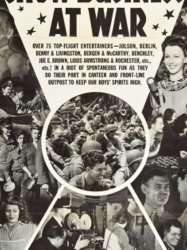
Show-Business at War (1943)
, 17minutesOrigin USA
Genres Documentary
Themes Documentary films about business, Documentary films about the film industry, Documentary films about war, Documentary films about historical events, Documentary films about cities, Political films, Documentary films about World War II
Actors Carole Lombard, Irving Berlin, Alfred Lunt, Loretta Young, Walt Disney, John Ford
Rating70%






Life Itself (2014)
, 2h1Origin USA
Genres Biography, Documentary
Themes Films about writers, Films about journalists, Documentary films about business, Documentary films about the film industry, Documentaire sur une personnalité, Documentary films about cities
Actors Roger Ebert, Stephen Stanton, Werner Herzog, Martin Scorsese, Errol Morris, Ramin Bahrani
Rating77%





Un documentaire inspiré des mémoires éponymes du critique de cinéma américain et chroniqueur social mondialement connu : Roger Ebert. Lauréat du Prix Pulitzer pour ses critiques publiées dans le Chicago Sun-Times, Roger Ebert est devenu l’une des personnalités les plus influentes du monde de la culture aux États-Unis.

Tally Brown, New York (1979)
, 1h37Directed by Rosa von Praunheim
Genres Documentary
Themes Films about music and musicians, Films about sexuality, Films about television, LGBT-related films, Documentary films about business, Documentary films about the film industry, Documentary films about music and musicians, Documentary films about cities, LGBT-related films, LGBT-related film
Actors Holly Woodlawn, Divine, Taylor Mead, Magdalena Montezuma, Rosa von Praunheim, Andy Warhol
Rating70%





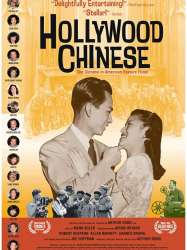
Hollywood Chinese (2008)
, 1h29Directed by Arthur Dong
Origin USA
Genres Documentary, Historical
Themes Documentary films about business, Documentary films about the film industry, Documentary films about cities
Actors Turhan Bey, Ang Lee, Joan Chen, Nancy Kwan, Christopher Lee, Tsai Chin
Rating76%





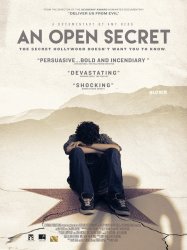
An Open Secret (2015)
Origin USA
Genres Documentary, Crime
Themes Films about children, Documentary films about business, Documentary films about the film industry, Documentary films about law, Documentary films about cities, Documentary films about child abuse, Films about child abuse
Actors Corey Feldman, Todd Bridges, Brock Pierce, Bryan Singer, Ben Savage, Macaulay Culkin
Rating72%





A feature documentary from Oscar-nominated director Amy Berg follows the stories of five former child actors whose lives were turned upside down by multiple predators, including the convicted sex offenders who owned and operated the now infamous Digital Entertainment Network (DEN).

My Big Break (2009)
Directed by Tony Zierra
Origin USA
Genres Documentary
Themes Films about television, Documentary films about business, Documentary films about the film industry, Documentaire sur une personnalité, Documentary films about cities
Actors Wes Bentley, Brad Rowe, Chad Lindberg, Greg Fawcett, Tony Zierra
Rating75%





Filmed over ten years, this controversial documentary follows five roommates trying to make it in Hollywood who face the unexpected consequences of fame.

Hollywood (1980)
Directed by Kevin Brownlow
Origin United-kingdom
Genres Documentary
Themes Documentary films about business, Documentary films about the film industry, Documentary films about cities
Actors James Mason
Rating92%





The series consists of thirteen fifty-minute episodes, with each episode dealing with a specific aspect of Hollywood history. The actor James Mason, an enthusiast of the period, supplied the narration; a lilting score was contributed by Carl Davis.

Trumbo (2007)
, 1h36Directed by Peter Askin
Origin USA
Genres Documentary, Historical
Themes Films about writers, Documentary films about business, Documentary films about the film industry, Documentary films about historical events, Documentaire sur une personnalité, Documentary films about cities, Political films
Actors Dalton Trumbo, Joan Allen, Michael Douglas, Liam Neeson, Paul Giamatti, Josh Lucas
Rating73%





En se concentrant sur la vie de Dalton Trumbo (1905-1976), ce film examine les effets sur les individus et les familles de la poursuite par le Congrès des communistes d'Hollywood après la Seconde Guerre mondiale. Trumbo était l'un des nombreux écrivains, réalisateurs et acteurs qui ont invoqué le premier amendement en refusant de répondre aux questions sous serment. Ils ont été mis sur la liste noire et emprisonnés. Nous suivons Trumbo en prison, en exil au Mexique avec sa famille, dans la pauvreté, dans le rejet public de ses enfants, dans ses écrits sous d'autres noms, et dans une éventuelle mais incomplète réhabilitation. Des acteurs lisent ses lettres ; ses enfants et ses amis se souviennent et commentent. Des photos d'archives, des films d'actualités et des interviews ajoutent de la texture.

Waking Sleeping Beauty (2009)
, 1h26Directed by Don Hahn
Origin USA
Genres Documentary
Themes Films about films, Documentary films about business, Documentary films about the visual arts, Documentary films about the film industry, Documentary films about cities, Musical films, Children's films
Actors Roy E. Disney, Michael Eisner, Jeffrey Katzenberg, Frank Wells, Howard Ashman, Steven Spielberg
Rating74%





The film covers the fall and rebirth of Disney's animation division, the effects the new corporate team of Michael Eisner, Frank Wells, and Jeffrey Katzenberg had on the division, the competition with Don Bluth's animation studio, the pivotal roles of Who Framed Roger Rabbit and the CAPS system, the introduction of the home video format, and the new-found success the studio had from 1989-1999.
 Connection
Connection

